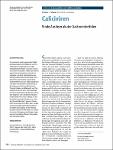Caliciviren
Virale Auslöser akuter Gastroenteritiden
Künkel, U.
Schreier, Eckart
Die weltweit in großer genetischer Vielfalt kozirkulierenden, hochinfektiösen und Umwelteinflüssen gegenüber recht widerstandsfähigen humanen Caliciviren verursachen neben vereinzelten Infektionen sehr oft regelrechte Gastroenteritisausbrüche. Sie verbreiten sich durch Kontamination von Nahrungsmitteln oder Wasser sowie durch direkte Personenkontakte sowohl durch Schmierinfektion als auch über Aerosole und sind daher eine große Herausforderung an die Hygiene und das Gesundheitswesen. Trotz des Fehlens von Zellanzucht- und Tiermodellsystemen für diese humanpathogenen Viren wurden durch den Einsatz molekularer Diagnose- und Charakterisierungsmethoden große Fortschritte in Bezug auf das Verständnis humaner Caliciviren, vor allem der “Norwalk-like-Viren”, gemacht. Immer mehr Genomsequenzen dieser Viren werden in internationalen Datenbanken publiziert. Sie bilden die Grundlage für die Verbesserung der molekularen Methoden zur Analyse der viralen Pathogenese und Epidemiologie und zur Entwicklung effektiver Präventions- und Kontrollstrategien. Human caliciviruses are highly infectious and co-circulate worldwide. They are responsible for many individual cases and extensive outbreaks of acute gastroenteritis. The ability of the viruses to survive in the environment facilitates the fecal-oral spread through water, food, aerosols, and person-to-person contact. Therefore, they are an important global public health problem. Despite the lack of a cell culture or animal model system to grow caliciviruses, great advances in our understanding of these pathogens, especially of the NLVs, have been made by using molecular methods. More and more information about the viral genome is being accumulated in data bases. This information will be used to develop sensitive molecular methods for the better understanding of the viral biology and epidemiology and will assist in developing strategies to prevent and control infections.
No license information

